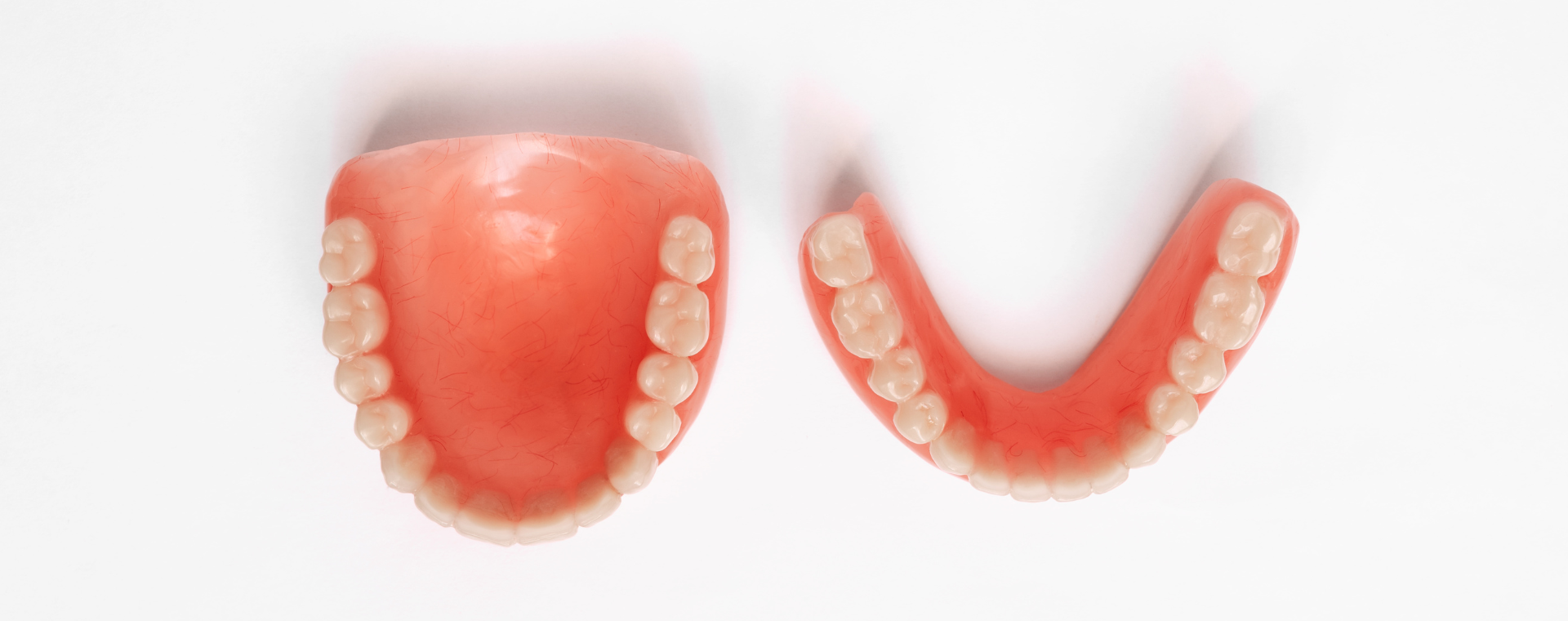
Getting new dentures can be an important step toward reclaiming your smile and your ability to eat.
Using dentures can be uncomfortable at first, however, and it requires developing new habits and skills. It’s vital that you understand how to care for your new dentures, and how to tell the difference between normal adjustment period challenges and abnormal complications.
Speech
When you first try on your dentures, you will probably find yourself lisping or feeling muffled when you speak. Don’t worry, your facial muscles and vocal habits will adjust with practice, and you’ll be able to articulate naturally with your dentures in. If you feel self-conscious practicing with others, consider reading out loud to yourself, or narrating what you’re doing while alone, until you get the hang of it.
Eating
Remember, your dentures are attached to your gum tissue rather than your jawbone, so they won’t have the same leverage as natural teeth, especially when moving sideways or at an angle. But with a little practice and adaptation, you can still enjoy delicious variations on almost any food.
For best results:
- Start easy. Soft, non-irritating foods like pudding, ice cream, mashed potatoes, and boiled or scrambled eggs are ideal for practicing with a new set of dentures.
- Give cooked meals time to cool. Your dentures don’t have nerves to warn you if a food is too hot. Carefully test the temperature with your lips before taking a bite, to avoid burning your mouth.
- Chew evenly and vertically. Separating a bite of food to chew on both sides at once can help keep your dentures balanced and stable. Stick to up-and-down motions rather than grinding your lower jaw from side to side.
- Be gentle with your incisors. Taking bites off of a larger piece of food using your front teeth can cause your upper denture to separate from your gums in the back. To prevent this, press your tongue outward against the inside of your upper denture to support it. Better yet, cut foods like apples into bite-sized pieces and avoid this maneuver altogether.
- Opt for smoother, tenderer versions of old favorites. Now is a great time to discover the joys of slow-cooked meats, baked casseroles, and soft-center chocolate truffles.
- Pick your battles. Tough meats like steak, sticky candies like caramel, and foods with hard pieces like popcorn or trail mix, will always be a challenge and a gamble for denture-wearers. Substitute where you can, and be ready for extra practice and cleaning if there’s a tricky food that’s important to you.
Adhesion
When your denture has been newly fitted, it may not need any help staying in place. As your gums change shape over time, however, you will probably need to use an over-the-counter denture adhesive.
If your gums change dramatically, you will need to bring your dentures back to the office for a reline procedure, to adjust the fit. This is especially common if you are in the process of healing from a tooth extraction.
Never try to modify a denture on your own, or use any product on it that was not designed for that purpose.
Cleaning and care
Keeping both your dentures and your mouth clean is essential to your health, and to your dentures’ continuing function. To prevent damage, loss, or microbial buildup:
- Brush your dentures once a day with a denture-safe brush and paste (these are softer than a regular toothbrush and paste).
- Brush the inside of your mouth twice a day. Floss any remaining natural teeth or implants.
- After eating, rinse your denture and your mouth separately with warm (not hot) water, to avoid buildup from food or plaque.
- Remove your dentures before bed and soak them in water while you sleep, unless the doctor has instructed you to leave them in. Do not let them dry out.
- One or two nights per week, add a denture cleaning solution to your overnight soak. After a cleaning soak, always rise dentures thoroughly in warm water before wearing them again.
- When not in use, be sure to keep dentures out of reach of children and pets. Dogs are frequent culprits when it comes to destroying dentures.
- Use a denture case to keep track of your dentures while traveling. Without this designated holding place, dentures are shockingly easy to lose.
Discomfort and troubleshooting
New dentures will typically feel ungainly in the mouth, and cause a few sore spots on the gums. While the ungainly feeling should pass with time, the sore spots point to areas of the denture that require adjustment.
The is a normal part of the denture fitting process. Most patients require one or more adjustments in the first few weeks of use. Dentures should also be checked annually to address any fit issues caused by long-term gum changes.
During the adjustment process, rinsing with a baking soda solution can provide temporary pain relief for sore gums. One quarter teaspoon dissolved in a cup of warm water with a pinch of salt works best.
If you notice any signs of infection, such as oozing, swelling, or fever, contact the office immediately, even if you already have an adjustment appointment scheduled.
When in doubt, give us a call! We’re here to support you through this process in any way we can.
